This article was medically reviewed by Luba Lee, FNP-BC, MS. Luba Lee, FNP-BC is a Board-Certified Family Nurse Practitioner (FNP) and educator in Tennessee with over a decade of clinical experience. Luba has certifications in Pediatric Advanced Life Support (PALS), Emergency Medicine, Advanced Cardiac Life Support (ACLS), Team Building, and Critical Care Nursing. She received her Master of Science in Nursing (MSN) from the University of Tennessee in 2006.
There are 16 references cited in this article, which can be found at the bottom of the page.
This article has been viewed 15,115 times.
Having a seizure can be disorienting and dangerous, so it's important to prevent them if you can. Epilepsy treatment is focused on preventing seizures because the condition can't be cured. However, if you or someone you know has epilepsy, there are a variety of ways to successfully prevent them. These include getting preventative medical care, making lifestyle changes, and avoiding triggers.
Steps
Getting Medical Care to Prevent Seizures
-
1See your doctor if you are having seizures. It’s important to get medical care as soon as possible. A doctor will exam you and run tests in order to try and figure out what is causing the seizures. Once they find the cause or run out of tests they can use for diagnosis, they will then address your symptoms and potentially give you medication to stop the seizures or limit how often they occur.[1]
- Some people that experience seizures and have been diagnosed with epilepsy have the condition due to either trauma to the brain or a family history of the condition. However, it is most common that the cause of the condition is unknown.[2]
-
2Keep a record of your seizures and triggers. Maintaining a good written record of when you had a seizure and any corresponding factors can help you and your healthcare provider to identify triggers. Use a calendar or planner to mark days when you had a seizure, and ask your family to help you do this. Include in each entry the time and how you were feeling beforehand. Some other things to note include:[3]
- How much sleep you had the night before
- If you had any alcoholic drinks and, if so, the number of drinks
- If you felt stressed
- If you were on your period (for women)
Advertisement -
3Get a prescription for an anti-seizure medication. Seizure medications don’t cure the condition but they will help your seizures be shorter and have less damaging effects. The medication that your doctor prescribes will vary, depending on the severity of your condition and what kind of seizures you are having. Be sure to discuss possible side effects with your doctor and follow their directions closely. Some common medications include, but are not limited to:[4]
- Carbamazepine
- Clobazam
- Diazepam
- Divalproex
- Lorazepam
- Phenobarbital
- Topiramate
- Valporic Acid
-
4Discuss ways to prevent hormonal changes that could trigger seizures. Hormonal changes related to menstrual cycles and pregnancy can bring on seizures. Talk to your doctor about whether there are medications you can take that will level out your hormone levels.[5]
- Your doctor may suggest changing the amount of anti-seizure medication you take depending on where you are in your menstrual cycle.
- In some cases, taking progesterone or birth control pills can help prevent seizures.
-
5Follow the doctor’s suggestions for seizure prevention. In addition to prescribing medications, your doctor should give you a variety of instructions about other ways to minimize your seizures. These will include a variety of dietary and lifestyle changes you should make.
- The medication your doctor recommends may impact things like bone-density and hormonal balance. Make sure to talk through the potential side effects of any medication your doctor suggests.[6]
- If your doctor does not have a lot of insight or experience with your condition, ask them for a referral to a doctor that does. In general, you should see a neurologist, which is a doctor with special training in treating disorders related to the brain.[7]
Tip: If you are having a lot of seizures and your neurologist isn't able to control your symptoms, ask to see a epileptologist, which is a neurologist that focuses specifically on epilepsy.
-
6Take your medication as prescribed. If your doctor prescribes you medication, make sure you take it as directed. Pay close attention to when you take the medication and how much you take. This will ensure that the medication is at appropriate levels in your blood stream at all times.[8]
- If you don’t take your medication at the correct times, the fluctuating levels can be a trigger for seizures.
- Get your medication refilled when it is running low so you do not run out.
-
7Work with your healthcare provider and practice self-management. Remember that there are a variety of factors that can trigger seizures, so it is important to take a holistic approach. Follow your doctor’s recommendations and learn as much as you can about self-management.[9]
Using Lifestyle Changes to Prevent Seizures
-
1Eat a healthy, balanced diet. A balanced diet that includes healthy fats and proteins could be a big part of preventing seizures. One diet that is often suggested for those with epilepsy is called a ketogenic diet. This is a diet that is high in healthy fats and protein and low in carbohydrates. Talk to your doctor and a nutritionist about whether this type of diet can help you.[10]
- Even if you can't do an extreme diet, like the ketogenic diet, make efforts to improve your diet. Don't eat unhealthy foods, such as sugars, refined carbohydrates, and processed foods, and eat a variety of fruits, vegetables, lean proteins, and whole grains.
- A healthy diet will help your brain function better because you will get all of the vitamins and nutrients you need. It can also reduce your overall bodily stress, as your blood pressure is likely to drop, among other positive effects.[11]
-
2Get plenty of rest. A change in your sleep schedule or feelings of sleep deprivation can cause seizures in those with epilepsy. Focus on getting restful sleep by making your bedroom relaxing, going to bed at a reasonable hour, and avoiding eating or drinking stimulants late in the day.[12]
- Getting enough rest will allow your brain to function better, minimizing the chance of a problem with the electrical activity inside of it.
-
3Take vitamins and herbs that can reduce your risk of seizure. While there needs to be more scientific research into the effectiveness of herbs and vitamins in reducing seizures, some are considered helpful. Consult with your doctor or a naturopath to figure out which are right for your condition.
- Some vitamins that might be helpful include B-6, E, and magnesium.
- Some herbs that could help with your condition include: burning bush, groundsel, hydrocotyle, lily of the valley, mistletoe, mugwort, peony, scullcap, and tree of heaven.
- If you want to add additional treatments that are not prescribed by your doctor, it’s important to tell them about what you want to take. Your doctor will be able to tell you if it is safe and or not. For instance, there are some herbs, such as St. John’s wort, ginko, kava, and valerian, which can interact poorly with anti-seizure medications.
Tip: It’s important to discuss any supplements you plan on taking with your doctor before you start taking them. This can help you avoid any negative interactions with medications you are taking.
-
4Strengthen your bones with vitamin D and exercise in case of a fall. Although these measures won’t prevent a seizure, they may protect you from broken bones in the event that you have a seizure and fall down. Take a daily Vitamin D supplement and aim for 30 minutes of exercise on 5 or more days of the week.[13]
- Try out different types of exercise until you find something you like, such as walking, biking, dancing, kickboxing, or running.
Preventing Seizures by Avoiding Triggers
-
1Avoid situations that overstimulate your senses. Common causes of overstimulation include bright flashing lights, watching TV, playing video games or computer games, and working on a computer. While these situations will not always cause seizures and won’t cause seizures in all people with epilepsy, it’s best to avoid them if you have a history of seizures related to light.[14]
- Only about 3% of epileptics have seizures that are related to flashing lights.
Tip: If you need to use a computer for work or you love to play video games and can't give them up, just be sure to take breaks often. Look away from the screen every few minutes, close your eyes, and give your senses a break.
-
2Minimize your stress. When trying to prevent seizures it’s important to implement a variety of stress-reducing practices. This should include a combination of taking yourself out of stressful situations and finding ways to cope with stress once it starts.[15]
- For example, it’s a good idea to do stress-relieving activities regularly. This could include exercise classes, yoga, meditation, working in your garden, or simply taking a hot bath. Whatever relaxes you, do it regularly.
- You should also walk away from stressful activities or situations if you can. For instance, don’t engage with angry or stressed out people if you don’t have to. Also, don’t pick activities that are stressful, such as highly competitive sports or political debates.
-
3Don’t drink alcohol or take drugs. Drugs can cause seizures immediately or can cause stress on the body that can make seizures more likely over time. In most cases, alcohol consumption itself doesn’t cause seizures but it is alcohol withdrawal that can cause them.[16]
- With this in mind, having a drink every few days is typically fine if your seizures are well-controlled with medication and you have discussed it with your doctor. However, having 3 or more drinks in one sitting is dangerous and binge drinking is even more dangerous for an epileptic.
- Some drugs seem to cause seizures more often than others. For example, having a moderate amount of caffeine is typically fine. However, stimulants like cocaine can cause serious seizures immediately.
- If you have an addiction to drugs or alcohol and you are epileptic, it's important to try to get sober. Talk to your doctor about good strategies for quitting and ask for a referral to a treatment program or support group.
Warnings
- If you have experienced seizures, it’s important to go to a doctor and get treatment. Untreated epilepsy can cause brain damage and trauma to the body that occurs during the seizure.⧼thumbs_response⧽
References
- ↑ https://www.mayoclinic.org/diseases-conditions/seizure/diagnosis-treatment/drc-20365730
- ↑ https://www.epilepsy.com/learn/about-epilepsy-basics
- ↑ https://www.uptodate.com/contents/seizures-in-adults-beyond-the-basics
- ↑ https://www.nhs.uk/conditions/epilepsy/treatment/
- ↑ https://www.epilepsy.com/learn/triggers-seizures/menstruation
- ↑ https://www.epilepsy.com/learn/managing-your-epilepsy/understanding-seizures-and-emergencies/importance-preventing-seizure
- ↑ https://www.epilepsy.com/learn/diagnosis/diagnosis-101/what-kind-doctor-best
- ↑ https://www.epilepsy.com/learn/triggers-seizures/missed-medicines
- ↑ https://www.epilepsy.com/learn/managing-your-epilepsy/self-management-program
- ↑ https://www.epilepsysociety.org.uk/diet-and-nutrition
- ↑ https://www.epilepsy.com/living-epilepsy/healthy-living/healthy-eating
- ↑ https://www.epilepsy.com/learn/triggers-seizures/lack-sleep-and-epilepsy
- ↑ https://www.epilepsy.com/learn/managing-your-epilepsy/understanding-seizures-and-emergencies/importance-preventing-seizures
- ↑ https://www.epilepsysociety.org.uk/seizure-triggers
- ↑ https://www.epilepsy.com/learn/triggers-seizures/stress-and-epilepsy
- ↑ https://www.epilepsy.com/learn/triggers-seizures/drug-abuse
About This Article
One way to prevent seizures is by eating a balanced diet that includes healthy fats and proteins, which will help your brain function better and reduce your overall stress. Consider talking to your doctor about starting a ketogenic diet, as the high-fat, low-carbohydrate diet is often suggested for people who suffer from epilepsy. In addition to dietary changes, make sure to get plenty of rest, since seizures can sometimes be triggered by feelings of sleep deprivation. Focus on getting restful sleep by making your bedroom relaxing, going to bed at a reasonable hour, and avoiding stimulating foods or drinks late in the day. Make sure to discuss any lifestyle changes with your doctor beforehand so they can help you avoid triggers. For more help from our Medical co-author, like how to take vitamins to curb your seizures, read on.

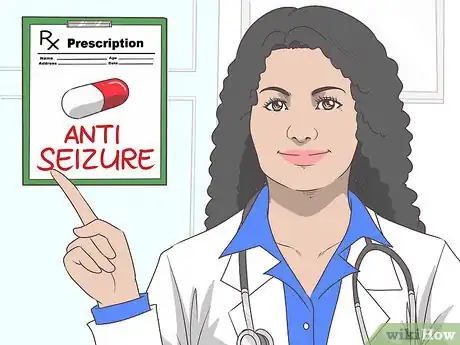


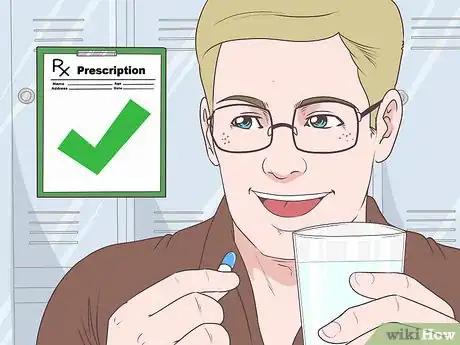


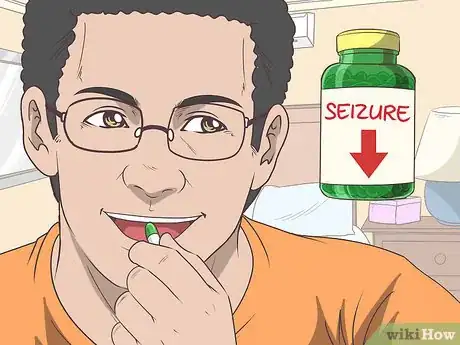
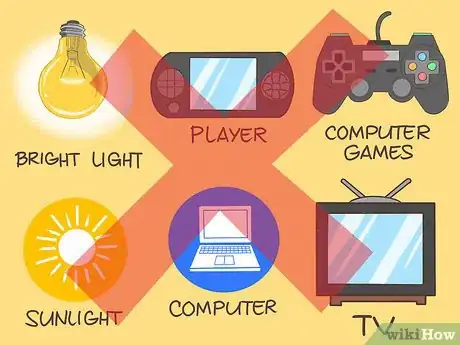





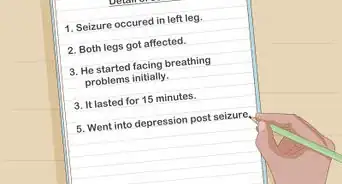













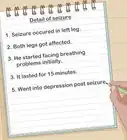



































Medical Disclaimer
The content of this article is not intended to be a substitute for professional medical advice, examination, diagnosis, or treatment. You should always contact your doctor or other qualified healthcare professional before starting, changing, or stopping any kind of health treatment.
Read More...